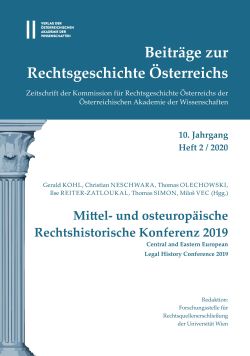|
 |
I. Rechtsgeschichte des Mittelalters und der Frühen Neuzeit
Pal SZABO, Szeged
„… Let her remain in the faith of the Greeks”. The Marriage Plan between
the Noble Family of Hunyadi and Celje in the Light of the Ecclesiastical
Union (1448, 1451)
Petr KREUZ, Prag
Die Gerichtsbarkeit der Prager Altstadt und der vereinten Prager Städte
in der Zeit der Jagiellonen (1471–1526)
Ivan MILOTIĆ, Zagreb
The Resolution of Boundary Disputes between the Habsburgs and the Venetians
in Istria by the Arbitral Decision of 1535
Łukasz GOŁASZEWSKI, Warsaw
The Procedure at the Noble Courts of the Kingdom of Poland
at the Turn of the 16th Century: the Ups and Downs
Josef LÖFFLER, Wien
Die Auswirkungen der theresianisch-josephinischen Reformen
auf die Stellung der Grundherrschaften
II. Verfassungsgeschichte 1789–1918
Marta BARANOWSKA, Toruń
Proceedings of the Rhine Province Assembly in Karl Marx’s articles as a source of knowledge
about political and legal debates in the mid-nineteenth century
Thomas SIMON, Wien
Sprachenvielfalt und Länderautonomie in Österreich-Cisleithanien
Ein schwieriges Verhältnis
Johannes KALWODA, Wien
Aspekte der österreichischen staatlichen Verwaltung in Dalmatien
am Beginn des 20. Jh.
III. Verfassungsgeschichte seit 1918
Dóra FREY, Budapest
Vom Nationalitätenministerium bis zur Vertreibung
Die rechtshistorische Aufarbeitung der Ungarndeutschen in der
ersten Hälfte des 20. Jahrhunderts
László KOMÁROMI, Budapest
Eine ungarische Debahe aus dem Jahr 1926 über die Funktion der Volksabstimmung
im politischen System. Hintergrund, Standpunkte und die spätere Entwicklung
Patrícia Dominika NIKLAI, Pécs
Die Volksunterrichtspolitik von Bálint Hóman und die Schulgründungen
im Komitat Baranya zwischen 1932 und 1942
Jaromír TAUCHEN, Brünn
Das Protektorat Böhmen und Mähren und seine Rechtsordnung (1939–1945)
IV. Privatrechtsgeschichte – Allgemeines
Andrzej DZIADZIO, Krakau
Der Code civil in der Rechtsprechung der Freien Stadt Krakau (1815–1846)
Zwischen französischer und österreichischer Rechtskultur
Ernest C. BODURA, Wien/Warschau
Pandektenlehrbücher auf Polnisch oder polnische Pandektenlehrbücher?
Anmerkungen zu zwei Hauptwerken der galizischen Pandektistik im 19. Jahrhundert
Kamila STAUDIGL-CIECHOWICZ, Wien
Die Teilnovellen als letzter Akt der österreichischen Zivilgesetzgebung
in Mitteleuropa
Stephan WAGNER, Halle a.d. Saale
Mitteleuropäisches Zivilrecht. Studien und Beiträge zum ADHGB
V. Privatrechtsgeschichte – Familien- und Sachenrecht
Eszter Cs. HERGER, Pécs
Ersitzung im unkodifizierten ungarischen Privatrecht. Auswirkung des ABGB
in Ungarn nach 1861
Linh Thị Mỹ NGUYỄN, Pécs/Cần Thơ
The Matrimonial Property Law in Vietnam 1858–1975
in the Mirror of the European Legal Development
Bernadett KRAUSZ, Pécs
The Difference between the Legal Status of Minor Children Born In and Out of
Wedlock Regarding Maintenance in the Hungarian Customary Law and Court Praxis
before 1946
VI. Justiz- und Strafrechtsgeschichte
Mateusz MATANIAK, Cracow
The Judicial Circle in the Free City of Cracow (1815–1846)
Tamás ANTAL, Szeged
Ministers of Justice in Hungary during the Austro-Hungarian Monarchy
Rieko UEDA, Toyama
Zwischen Juristen und Winkelschreibern in Cisleithanien
Ein Studienversuch über öffentliche Agentie anhand der Akten
des k.k. Justizministeriums
Kinga BELIZNAI BÓDI, Budapest
Materielle Unabhängigkeit und Besoldung der Richter in Ungarn
mit besonderem Bezug auf die 1920er Jahre
VII. Wissenschaftsgeschichte
Nadja EL BEHEIRI, Budapest
„Herkommen“ als staatsrechtlicher Begriff zwischen System und Praxis
Theodor Mommsen versus Wolfgang Kunkel
|
